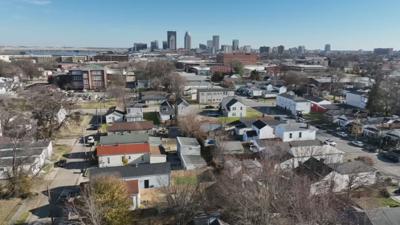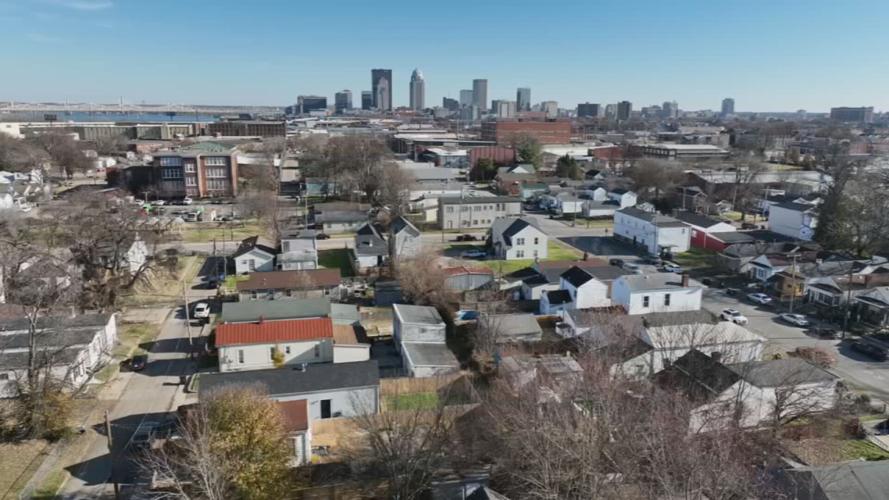LOUISVILLE, Ky. (WDRB) – The affordable housing needs for Louisville’s lowest-income households increased. More than one-quarter of all city households paid more than the recommended amount for housing expenses like rent and utilities.
Those are among the sobering findings from Metro government’s new report on housing trends released Wednesday. The study evaluated 2017 through 2021, updating a prior review that began in 2012.
In particular, it shows that there were not enough homes in Louisville for households earning up to $25,410 – the lowest income group studied. The inventory lagged by more than 36,000 units, up from the roughly 31,400 needed as of 2017.
The gap narrowed for households making up to $42,350 – or 50% of the Louisville area’s median income--- which need more than 14,000 units.
"The new housing needs assessment makes it clear that we have to move with an even greater urgency than we've been talking about to provide more affordable housing for folks in Louisville," Mayor Craig Greenberg said at Metro Hall on Wednesday.
Affordable housing, Greenberg said, means paying no more than 30% of monthly income on housing expenses. He has made adding affordable units a key goal of his administration since he took office in early 2023, pledging to add or keep 15,000 such units by 2027.
"God has opened doors for me and my kids," Hope Turner, who is new homeowner, said.
In 2019, Hope Turner divorced her husband. At the time, she had two children, a mattress on the floor, and one table.
"Before I got married, I was always on my own. It was easier. But when I had kids, it was a different ballgame," Turner said.
With three mouths to feed and daycare bills to pay, her job wasn't enough to support them. They needed reliable shelter.
"I wasn't going to let my kids go to no system. I was going to take care of my children," Turner said.
The city's Resilience program helped her re-build.
"There was a folder on the table and it was a voucher for a place for me and the kids. I was so blessed and honored, because I didn't know what I was going to do with my kids. I was able to take those checks, fix my credit, and save up money to pay them bills and put money aside for a rainy day," Turner said. "I was able to buy myself a house for my children. They have their own rooms. So, it was just a blessing."
The goal is to give more families the chance to have a home just like Turner.
"After, not only losing my parents, I was a single mom and I didn't know A to Z, like I said, when he walked out out. So I'm very blessed and honored for all the programs that I used. I use them as a stepping stone, to better myself because I want to be better for my kids. I want to send that generational wealth for my children, so when they get older, and they go through some situation, they have a house to go to, they can always go home to," Turner said.
There have been some bright spots, said Christy McCravy, executive director of the Louisville Affordable Housing Trust Fund. Those include investments in the fund that have led to the allocation of more than 5,600 housing units.
About 1,000 of those are dedicated to the lowest-income households, she said.
"A family of four living on less than $30,000 can have hope," she said.
But the challenge facing the city is daunting. In the overall Louisville region, building permits show there were about 6,800 housing units of all kinds and price points started last year.
Greenberg acknowledged that those figures are "weak" and "anemic." But he, affordable housing advocates and Metro Council members believe government-led action can help create more units.
Among those is a push for "middle housing," or duplexes and other multifamily units on land now zoned for single-family housing. A draft of new regulations to the city’s land-use plan was released this week.
Greenberg also unveiled the final version of his housing plan called My Louisville Home.
"No matter what our housing plan is it must include both short term, like expanded rental assistance, and long term, like mixed-use buildings and middle housing solutions that have been mentioned here today," said Metro Council member Shameka Parrish-Wright, D-3, who spoke alongside the mayor at Metro Hall and serves on the council’s new ad hoc committee on land use.
Council member Ben Reno-Weber, D-8, attended the press conference and told WDRB News afterwards that the housing needs report shows that there is "no silver bullet" to solving the city’s affordable housing shortage.
"This is going to be a combination of small initiatives that are going to include some changes to ordinances and the (land development) code that are going to include innovative programs that are going to deeply engage community in the kinds of housing that they want to see," he said.
This story may be updated.
Copyright 2024 WDRB Media. All rights reserved.














